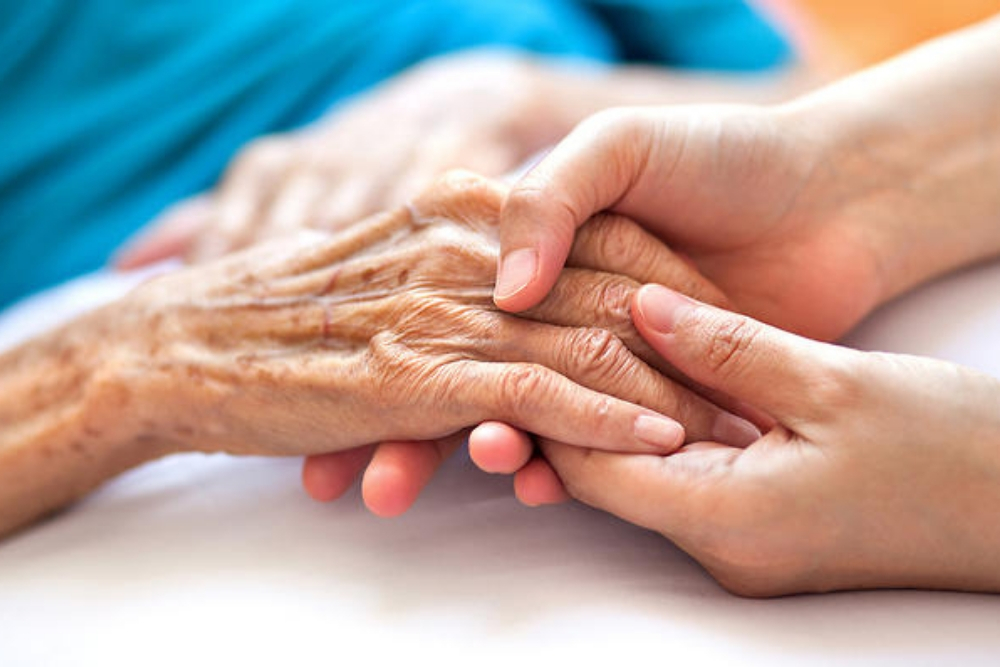What is a Palliative Care Pathway? And how does it work?

Tags:
Palliative CareJanuary 4, 2019
Whenever someone has been suffering from a long-term, life-shortening or terminal disease or condition, there comes a time when care needs to shift from providing quality of life to making the process of dying as comfortable and stress-free for the person and their family.
This is true end of life care, it happens when a patient is likely to have a week or less left of their life, and it is known as a palliative care pathway. Think of it as a roadmap to make the last days of your loved one’s life as stress-free, pain-free and as comfortable as possible.
It can be very hard to face the reality that the end of a loved one’s journey is near, but this type of care is very important, because, at the end of anyone’s life, there are some crucial things to be done, whether it’s finalising legalities or just spending time with the people who love them the most.
The palliative care pathway makes it easy for carers to provide the right kind of support and care to the patient and their family and lets the family focus on something other than day to day decision making. At a time when emotions and stress levels are high, this in itself can be a great comfort.
When you are facing the reality that a loved one is dying, it can be hard to make decisions like these. This article should answer your questions about what a palliative care pathway is, why it is recommended for your loved one, and what will happen next.
Palliative Care Guide - get your free copy
What Does a Palliative Care Pathway Do?
A palliative care pathway is usually drawn up by the palliative care services team who is providing end of life care to a terminally ill patient. It is designed to ensure that the team provides the best possible care for the person as they live out the last days of their lives, and it helps to provide some much-needed structure and focus for the affected person and their family.

Because the medical, spiritual and physical care of the person is planned already, everyone has more time to spend on making decisions, having important conversations, and preparing for what comes next.
For example, if the palliative care was taking place in the home, where 60-70% of Australians would like their death to take place, and our very own Care For Family care team were in support, we would be able to coordinate the Palliative Care Pathway for you.
You might be interested in a message we received from Wilma, who's mom we supported through her last days:
"I was so impressed that within 8 hours of requesting care for my Mum we had a care team in place offering the most incredible caring support.
"From the moment she was discharged from hospital, at her wish, there was Cristina, waiting for us at her home.Thank you also to Susie, the team psychologist for helping us normalise the grief process we were going thru, which allowed us to feel how we really felt at that time.
The carers were so helpful and supportive and professional. They even cooked us meals while we spent precious times with Mum.
"I highly recommend Care For Family, a remarkable company." Wilma and family, May 2018
When Does the Palliative Care Pathway Begin?
If your loved one has been in the care of professionals, there will be signs that they are reaching the end of their life and that death is imminent.
The healthcare professionals who work with your loved one will know what to look for, and when they notice these changes, they will discuss the shift in care from life-supporting to end of life with the family or any other key decision-makers. At this point, the decision will be made to change the type of care being provided.
Get a Free Palliative Care Support Assessment
How Can Family Members Help?
The professionals on your loved one’s end of life care team will probably ask you for input on any aspect of the palliative care pathway where non-medical decisions or choices need to be made.
They will ask about what matters most to your loved one, and probably for important contact information and details. They will certainly also want you to remain involved in your loved one’s day to day activity as far as possible, and they will also welcome input and feedback about the level of care that is being provided.

At Care For Family, we believe that even when independence has been lost due to adverse health issues, people can still retain their independence as much as possible by having the freedom to pursue their passions, interests, hobbies and relationships. This is why palliative care at home, rather than in a residential care home is so important to the well-being of the person receiving care.
We enable family members and friends to remain active in their loved one’s life by providing compassionate, consistent, medical, physical, psychological and spiritual support to everyone involved.
When anyone’s life is ending, it can be extremely difficult to focus on the day to day requirements that provide comfort and support, and by setting up a palliative care pathway before this time comes, you won’t be burdened with difficult thoughts and decisions when your focus should be on the time you have left with the person you love.
Read the Palliative Care Guide
What Will the Palliative Care Pathway Cover?
Every family is different, as is the progression of every disease, so there’s really no one size fits all solution when it comes to end of life care. However, your loved one’s pathway will probably cover the following:
1. Comfort
One of the most important parts of the pathway will be focused on comfort. At the end stage of any disease, pain management, managing confusion, dealing with fears and stress and spiritual needs all form a part of the comfort needs, and they will all be managed very carefully. At Care For Family, we always offer our patients and their loved ones our palliative care counselling services to help during this time, which is additional to the palliative care nursing support provided.
2. Medical Care
At the end of the disease process, when your loved one is ready to be on a palliative care pathway, it may no longer make sense to use medications that are designed to prolong life, or that have unpleasant side effects. It may be worth increasing the dose of pain medications that may otherwise not be advisable due to long-term effects.
In this case, the palliative care plan may include changes to medical care that alter medication regimes, and that shift the focus away from treatment, and onto immediate comfort needs.

3. Nutrition and Hydration
Many people who have reached the last stage of a terminal condition are no longer as hungry as they were, or hungry at all. The palliative care plan will include details about managing nutrition and keeping your loved one hydrated, even if they don’t feel like eating. This is a normal part of the process, but it can be distressing for family members, so the team will probably discuss this with you to prepare you for it.
4. Communications
Even when a family member is dying, it’s not always possible to be with them every hour of the day. Jobs, families and other commitments still have to happen, even though there is such a major change going on.
The palliative care pathway will take this into account and set out how news and changes will be communicated, when, and to whom.
When you can’t physically be with your loved one, it’s comforting to know that their care team will keep you involved in important changes and decisions.
5. Review
It’s important to note that the palliative care pathway is subject to review. In some cases, a patient who is on a pathway will rally enough that their team no longer feels it is appropriate at the time. In these cases, the patient will be taken off the pathway, and their normal care will be resumed.
Palliative care pathways are typically reviewed every couple of days, and any changes that may be necessary are discussed and made as necessary.
6. Care After Death
If your loved one remains on the palliative care pathway until they pass, the pathway will not end immediately. Part of each pathway includes wishes for care after death, and these will be documented by the team as well.
Care for the Patient and Their Family
It’s important to note that while the primary focus of the palliative pathway is to provide comfort to a dying patient, the team involved is also there to provide comfort and reassurance to their family and loved ones.
If you have questions about what is happening, what will happen, or what you should be doing at this difficult time, the trained staff on the team will be able to answer them, and they are there to do just that if you need them to.
Everyone’s experience of illness and dying is different, and every family is different. You may find that especially after a long and painful illness, your loved one is tired and possibly even relieved that their suffering will be over. Or you may find that they need some extra support to make this final transition. Wherever your family falls on the spectrum, the team is there to support you.
If your loved one’s team has determined that it is time to put them on a palliative care pathway, and you need clarity and reassurance about what is happening to them, talk to the professionals involved. This is a very difficult time for most families, but you don’t have to go through it alone.
If you’d like to talk to us about supporting you and your family, we’re happy to provide advice and a free palliative care assessment so that you can make an informed decision about the path ahead.
You might also like to read the following posts about Palliative Care:
- What Is Palliative Care?
- Your Top Palliative Care Questions Answered
- What Happens When You Have In-Home Palliative Care?
- In-Home Palliative Care Support: What's Available
- Palliative Care Counselling: What You Need To Know
- Professional Advice on The Main Palliative Care Issues
- The Remarkable Truth About Palliative Care Nursing
